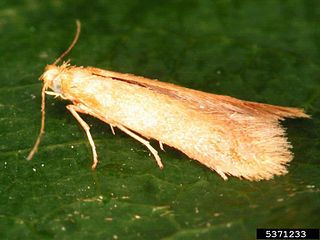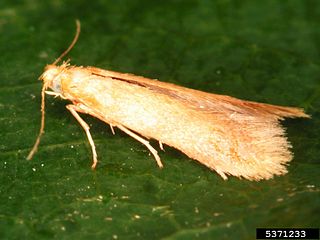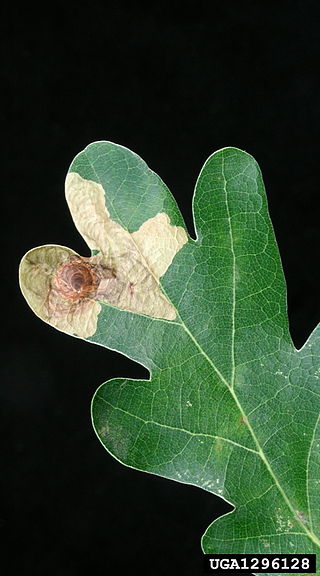
Tischerioidea is the superfamily of "trumpet" leaf miner moths. The superfamily contains just one family, Tischeriidae, and traditionally one genus, Tischeria, but currently three genera are recognised, widespread around the world including South America, except for Australasia. This is one candidate as the sister group of the bulk of Lepidoptera, the Ditrysia, and they have a monotrysian type of female reproductive system. These small moths are leaf-miners in the caterpillar stage, feeding mainly on Fagaceae, Asteraceae, and Malvaceae (Astrotischeria), and some also on Rhamnaceae, Tiliaceae, and Rosaceae.

Tischeria is a genus of moths in the family Tischeriidae. The genus Coptotriche was long treated as a synonym of Tischeria, but is now considered distinct.

Tischeria decidua is a moth of the family Tischeriidae. It is found in Central and Southern Europe, but has recently expanded its range and has been spotted in the Netherlands and Poland.

Tischeria ekebladella is a moth of the family Tischeriidae. It is found in most of Europe and the Caucasus.
Tischeria ekebladioides is a moth of the family Tischeriidae. It is known from Spain, Portugal and Tunisia.

Tischeria quercitella, the oak blotch miner moth, is a moth of the family Tischeriidae. It has been sighted in North America in Ontario, District of Columbia, Illinois, Kentucky, Massachusetts, Missouri, New Jersey, Ohio, Pennsylvania and Virginia.
Tischeria pulvella is a moth of the family Tischeriidae. It was identified and described in Texas, United States, in 1878 by Vactor Tousey Chambers.
Tischeria ceanothi is a moth of the family Tischeriidae. It is known from California and Nevada in the United States.
Tischeria unicolor is a moth of the family Tischeriidae. It is known from St. Croix in the Virgin Islands.
Tischeria elongata is a moth of the family Tischeriidae. It is known from Guerrero in Mexico.
Tischeria deliquescens is a moth of the family Tischeriidae. It is known from Guyana.
Tischeria gouaniae is a moth of the family Tischeriidae. It is known from Belize.
Tischeria ambigua is a moth of the family Tischeriidae. It is known from California, United States.
Tischeria bifurcata is a moth of the family Tischeriidae. It is known in the United States from Arizona and California.
Tischeria urticicolella is a moth of the family Tischeriidae. It is known from the Democratic Republic of Congo.
Tischeria antilope is a moth of the family Tischeriidae. It is known from Namibia.
Tischeria sparmanniae is a moth of the family Tischeriidae. It is known from South Africa, Zimbabwe and Namibia.

Coptotriche marginea is a moth of the family Tischeriidae, found in most of Europe. It was named by the English botanist, carcinologist and entomologist, Adrian Hardy Haworth in 1828, from a specimen found in England. The larvae mine the leaves of brambles (Rubus) species.

Astrotischeria astericola is a moth of the family Tischeriidae. It was originally described by Annette Frances Braun as Tischeria astericola in 1972. It is found in eastern North American woodlands.
Tischeria gaunacella is a species of lyonetiid moth in the family Tischeriidae.





